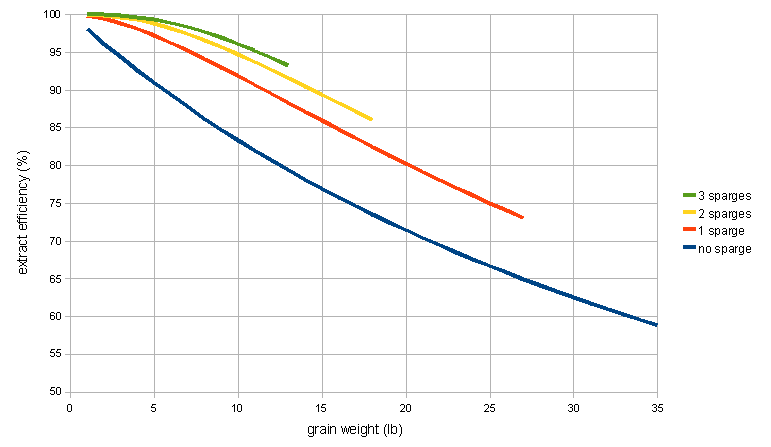JerD
Well-Known Member
Brewsmith software offers a bunch of different option for batch sparging, one sparge, mutiple sparges of equal amounts, etc. What are the benefits and drawbacks of the different methods?

howtobrew.com
do a search for 'sparging' and Palmer will fill you full of knowledge.
So let me get this straight. You guys are suggesting mashing with 7-8 gallons of water and then not rinsing the grain bed afterwards?
Right now I mash at 1.25-1.5qts per pound. So a 12Lbs grain bill I'll use 17-18qts. I'll slowly drain over a 30min time then add another 15qts and drain for maybe 20minutes.
What's the opinion?
I also had a similar question about this. After reading this is what I got.
Batch Sparge is:
Mash as usual.
Collect and pour back in till it runs clear.
Let 'er rip until empty.
Refill with Sparge water let sit for however long you want.
Collect and pour back in till it runs clear.
Let 'er rip until empty.
Do I have that right? Im going to be going all grain by the end of the month and want to be clear on this.
Well shoot, this is good info. I've read Palmers a dozen times and its not clear on the times. So it's 5 minutes for the first runnings, add water 170F, stir, 5 minutes for the rinse. Yes?
Brewsmith software offers a bunch of different option for batch sparging, one sparge, mutiple sparges of equal amounts, etc. What are the benefits and drawbacks of the different methods?
If your cooler is big enough, try doing only one sparge. I can hit 80+ efficiency with only one and was just talking to someone who switched from 2 to1 and had great results. And save yourself some time...there's nothing to be gained form those 15 min. rests in the sparge.
I just stir in the sparge water, vorlauf, and runoff...no rest at all. I've experimented with times from 1/2 hour to nothing and it just didn't make any difference. If I predict that my mash runoff and sparge runoff will be more than a gal. apart in volume, I don't bother trying to equalize them. I haven't seen any benefits when they're that close. More than that and I'd add water to the mash before running it off. I had been working toward thinner mashes and once I read Kai's work, it was all the incentive I needed. I mash at 1.5 qt./lb generaaly these days.
if you want to have equal volume of runnings without adjusting the mash ratio you can always do a mashout. So in your case John, if you typically get 2g's from the first runnings at 1.5 qt/lb and need 4g more for preboil volume, add 1g at the end of the mash and you should end up with 3g's from each of the runnings.
My question was for batch sparge one. This was obviously too small amount of water for a sparge by itself, so I ended up just doing one round of with all of the sparge water. I am not sure why Beersmith set this up as a "sparge". It seems more like a mashout to me. Am I missreading this step, or do I have Beersmith configured wrong?
Just when I thought I was finally understanding mashing/sparging I read this thread and now I am totally confused again.
What telemarkbrew just said is the ideal way of performing a single batch sparge. Equal runnings size maximizes efficiency given the constraint of two runnings. Three runnings of 2g each would be a little more efficient (2-3%) but requires an extra stir and vorlauf. You decide.
Fair enough. Certainly for those who are having issues getting their efficiency up to what they'd consider acceptable, a double sparge is ONE way to do it at a cost of extra work. If you're in the mid 80% brewhouse area, 3-4% more isn't all that big of an incentive.
Batch sparging is so easy that it seems like sometimes people feel like it needs to be more complicated!
I guess if people are having efficiency issues, the first place I'd look is the crush. After that, mash tun dead space. Might as well try to get to the root of the problem. But if the cooler you;re using is short on capacity (like the round 5 gal.), a 2nd sparge may be the only answer (well, actually a bigger cooler would be the answer!)

I decided a long time ago that for the extra effort it just wasn't worth the time or effort. I average 82-84% with a single sparge and that's good enough for me!
I can't remember if I had my own grinder back then. My efficiency was around 75% with batch sparge and it's around 85-90% with fly sparge. I'll have to give it a shot and see.
Denny, do you drain then add your sparge water. That's what I used to do when I did single batch sparge. I've been doing fly sparge for quite a while now. Been thinking of switching back to save on time but have been worried about losing efficiency.
I can't remember if I had my own grinder back then. My efficiency was around 75% with batch sparge and it's around 85-90% with fly sparge. I'll have to give it a shot and see.
(BTW, I feel like I'm talking to myself when I talk to you. lol)
Hell...I would like to know if changing to fly sparge was your difference. I would tend to think its just your crush, but if its the sparge, I'm investing in fly sparge equipment asap!
Enter your email address to join: